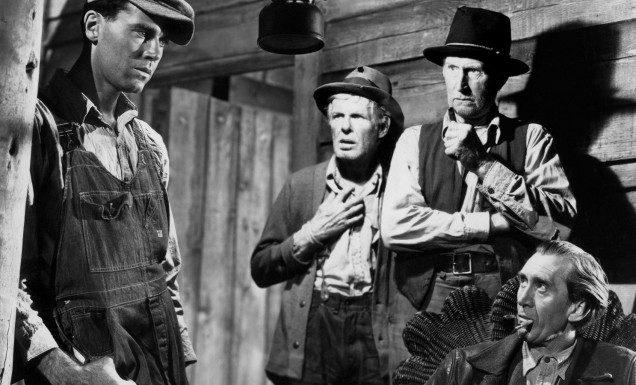Grapes of Wrath
drama, USA, 1940 | Mjesto prikazivanja filma: Kulturno informativni centar KIC (Preradovićeva ul. 5)
DIRECTED BY: John Ford

CAST:
Henry Fonda,
Jane Darwell,
John Carradine,
Shirley Mills,
John Qualen,
Eddie Quillan
SCRIPT:
Nunnally Johnson
PHOTOGRAPHY:
Gregg Toland
MUSIC:
Alfred Newman
EDITING:
Robert L. Simpson
SCENOGRAPHY:
Thomas Little
COSTUMES:
Gwen Wakeling
Synopsis:
Oklahoma in the era of the Great Depression. Tom Joad is released from prison and returns to the modest family estate. Through meeting former preacher Jim Casy, who lost his faith. There is no one left on the family property, and a neighbor tells them that the Joads were evicted from the property because they could no longer repay the loan. Tom reunited with his large family at his uncle's estate, and together, in an old car converted into a truck, they set off for California, hoping to find work there. On the way, the old grandfather dies, and Tom's pregnant sister is abandoned by her husband. The real head of the family is actually Tom's mother called Ma Joad, a strong woman determined to keep the family together...
In 1939, future Nobel laureate John Steinbeck's novel Fruits of Wrath was the biggest American bestseller, selling almost half a million copies. Just one year later, the Hollywood film version was created, directed by John Ford, as one of the achievements that would bring great fame to its author and make him the most respected American director in his homeland and the world in that period. Steinback was a leftist and his novel is a fierce criticism of the ruthlessness of the capitalist system, which is expectedly softened in the film adaptation, but even so softened Fruits of Wrath is one of the most socially critical films of the classic Hollywood period. Thus, in the anti-communist 'witch hunt' that followed in the years after World War II, both Steinback and Ford were suspected of communist leanings by the US Congress. Ford, quite logically considering its subject, imagined the film in a realistic style, so a significant part of it was shot not in a studio but on location, the scenography is modest, and the photography is by Greg Toland - the leading cinematographer of that period, who will become famous next year with Orson's Citizen Kane Welles - it was conceived on the model of contemporary photo reports and documentaries on social topics, although the influence of expressionism (emphasized shadows) is also very clear. Fruits of Wrath was well received not only by left-wing criticism, and their reputation has not significantly declined over the decades. Moreover, in 1989 they were among the first 25 films selected by the Library of Congress for preservation in its National Film Registry as works of special cultural, historical, or aesthetic significance. Let's also mention that Fruits of Wrath was nominated for seven Oscars - for best film, direction, screenplay, leading male role (Henry Fonda), supporting female role (Jane Darwell), editing and sound, and the Oscars were awarded to Ford for directing and Darwell for supporting women's roles.
Author of the text: Damir Radić
b/w, 129'